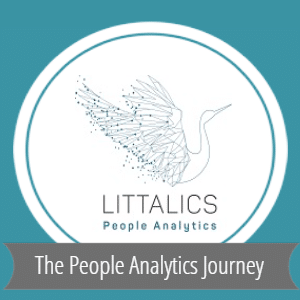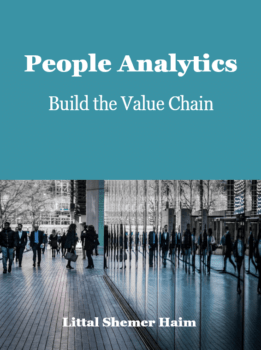(This article is based on my Hebrew “TED” talk, which was dedicated to Israeli HR women, at the conference “People Analytics & HR Dashboards” in March 2018. Read also my list of Public Speaking).
You will not see any dashboards in this Article. You will not be exposed to any technological tool, either. And yet, you will have a chance to learn the secret of success in People Analytics. In my point of view, the things we heard in the “People Analytics & HR Dashboards” conference were essential, but they will not guarantee success in the field. I invite you to follow me in the next few paragraphs and explore this profession, People Analytics, from a completely different perspective.
Homage
In art, an Homage is a form of appreciation, usually expressed with a clear hint of an artist’s work. We often see artists who deliberately quote or repeat an idea that appears in another artist’s work. Do we do something similar in the world of organizations? For example, do we adopt innovative ideas of colleagues, and repeat them in our own version? How many times in your career have you learned a new practice from a colleague and transferred it into your organizational culture?
At the end of 2017, I was chosen by HR-Tech-Nation as a blogger to follow in 2018. I was the only woman on the list. A few days later, I decided to start a personal challenge, and salute 365 women data heroines, one woman a day. My list would include inspiring women in data, but not only in HR Tech. I decided to mention the women behind fantastic case studies in the field of People Analytics.
Within a few days, this project was out of control. I could not believe how viral it went. I received recommendations about women professionals from all over the world. The project was mentioned as one of the top 10 HR & People Analytics articles in a monthly list of IBM’s David Green. A month passed, and I was honored and humbled to find myself on a list of 30+ top global influencers in HR-Tech, along with people like Laszlo Bock, Josh Bersin, and many others, whom I did not believe my name would ever appear on their side.
My project has become a snowball of inspiration. The writer of “30+ top global influencer in HR-Tech” specifically mentioned that she was inspired by my project, and decided to combine a gender-balanced list of influencers. She even edited it to present genders alternately. Many records of leading HR and technology professionals have been published, but this one was the first world gender-balanced list.
But let’s go back to my project. I decided that my list would not include only names and links to LinkedIn and Twitter. Instead, I insisted on including references for each of my data heroines’ works, which I can learn from. While doing so, I realized that I was actually creating a collection of role models for myself: an international group of women, which are professional leaders, in a domain that is traditionally dominated by men.
Be an eternal student
I’ve been in the world of data for twenty years now. My background is interdisciplinary. I graduated from The Technion – Israel institute of technology. In addition to expertise in HR processes, I have spent many years studying statistical modeling. I feel comfortable with numbers. Unfortunately, most women HR leaders which I meet, declare at the very beginning of our conversation that they do not like numbers at all. The most honest HR leaders may say that they are frightened by the expectations to handle numbers, needless to mention prediction models. After all, they chose to graduate psychology, not machine learning.
However, when I gathered details about my data heroines and explored their career milestones, I found that most of them did not have a technological background. They have managed to create change and make HR data-driven, with their background in social studies.
I believe that the importance of my emerging list is the inspiration and the encouragement for every woman, and especially women in HR. This is possible. Many other women, just like us, with similar backgrounds and experience, have made it. They were able to enter the world of data, and so can you. Every one of us can learn, but maybe we lack some female role models, some characters that can help us to realize that we can succeed in data. Each time I update my list, I learn something new and embrace some practice. Read my list and get to know these heroines. You’ll find out that they also learn all the time. Being an eternal student is one ingredient in the secret sauce of success in People Analytics.
What is the other ingredient in the secret sauce of success? Three years ago, I took R programming courses. It was a great experience, but not because programming is fun. I discovered the power of an active community. In every line I had to code, a million developers around the world virtually stood by my side. At Stack-Over-Flow, on R bloggers, every problem I’ve encountered has been resolved dozens of times before, by experienced and brilliant developers. Their accumulative knowledge was available, and all I needed was to articulate my question, and the answers flowed.
When I continued remote studies of Workforce Predictive Analytics, I was wondering if the new profession, being called People Analytics, will embrace an open-source culture. Fortunately, it does! There are communities of dozens and hundreds of professionals in this field, who share knowledge, help each other, create events, and meet. Why does this happen?
Open Source Culture
Open-source culture is necessary for innovative fields. Small open source communities emerge from a need to develop something new. Also, people learn best when they need to teach others. Everyone who ever trained others could experience it. I remember my best Statistics studies, which occurred when I guided analysts to use SPSS. I had no choice back then but to illuminate the darkest corners of my knowledge to answer students’ questions. Shelly Palmer, the famous technology guru, once described the process of becoming a great programmer: You do it every day, and then share it with a community of people like you, who also do it every day. This is not taught at school. This is the secret weapon!
So People Analysts do meet at conferences, but it is not enough. We share common passion and challenges. We should feel comfortable to contact any People Analytics professional in the world. This is the second part of success: being a part of open-source culture.
At this point, I’m pretty sure that you have some objections in your mind. Maybe you are afraid that you are not enough skillful or experienced in this field. Or, perhaps you think that what is done in your organization is confidential, so surely it can’t be shared. Let me dismiss these objections. First, I truly believe that anyone can contribute, no matter how experienced or inexperienced. If you make the first steps, raise questions. If you are worried about your mistakes, share your thoughts, and let others learn from your blunders. Influence does not belong only to the greatest successors. It is a potential that exists in each member of the community.
Secondly, in regard to confidentiality, you don’t have to violate your organization’s rules. You can simply share your experience, and decisions that were made, but without disclosing one record of data. Furthermore, go back to my women data heroines, and see for yourself how much you can learn from organizations that share their journey in the field of People Analytics, and publish case studies in conferences and articles.
The future: Procurement and Ethics
The digital transformation explodes right into our faces. The pace of innovation in the domain of HR Tech is too fast to follow. Did you know that only in Israel, we have an HR-tech company per every 106,000 citizens? These numbers are phenomenal!
The easiest thing to do is to withdraw back to a comfort zone, which does not include numbers and models. But instead, we can stand up straight in front of the technological wave that is sweeping us. If we have an open-source culture and community, and if we have role models for eternal studies, then we can cope!
In general, I think that the future of People Analytics will be involved with numbers and models in a completely different way. Today we refer to it as the Data Science of HR, i.e., a profession that is involved with a deep understanding of organizational processes, along with a background in Statistical and programming. However, the future will be different. Next month, I will present my prediction about the future of this field in the HR & People Analytics Forum in Budapest. My forecast includes two words: Ethics and Procurement.
We can’t overemphasize this: When you start the People Analytics initiative, you start with a business question. But technology today offers automation, or actually a start-up company, for every business question. I’m sure that within a few years, there will be no need to write even a single line of code in an analytical project. Instead, we will only match the business questions to the most suitable technologies. This is the procurement I’ve mentioned.
In addition, we will have to expand our responsibility to all stakeholders in the organization, including employees. We will be the ones who ensure that automation and artificial intelligence serves employee interests rather than harm them. This is the Ethics part of our future job. Alongside the current discussion about regulation, I expect that the Ethical debate will widen. In fact, it already is!
Future People Analytics is going to be fascinating. I look forward to being there. I hope you do too.
An overview of future role of HR leaders in improving business performance by informed decisions about people based on data. People Analytics transforming HR; The Role of People Analytics Leader; Case Studies and Simulations; Emerging trends of HR tech.







